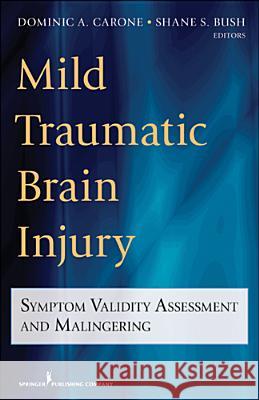Mild Traumatic Brain Injury: Symptom Validity Assessment and Malingering » książka
Mild Traumatic Brain Injury: Symptom Validity Assessment and Malingering
ISBN-13: 9780826109156 / Angielski / Miękka / 2012 / 448 str.
Overall, this text is excellent, beautifully formatted, and contains many chapters on mild traumatic brain injury that would prove helpful to professionals working in this field. While the text is probably most suited for a graduate level class in a university curriculum, I think it would be an excellent resource for the practicing professional's library--the forensic expert, the life care planner, or the rehabilitation counselor."--The Rehabilitation Professional This] book will provide a valuable resource to neuropsychologists and non-neuropsychologists alike for many years into the future as the primary, one-stop shopping bank vault of information relating to symptom validity assessment in the very specialized world of mild traumatic brain injury."--Psychological Injury and Law The book is well written, engaging, and easy to read. It goes well beyond simply reviewing validity test literature, as numerous clinical issues related to both mTBI and validity testing are discussed, validity assessment in multiple clinical and forensic settings is described, and up-to-date research findings are provided. I would recommend this book to any clinician (or clinician in training) who wants a practical guide specifically devoted to integrating validity assessment techniques and outcomes into clinical work."--Archives of Clinical Neuropsychology This edited book is clearly the best in the field among the several that have just come out on the topic. The chapter authors are leaders in the field, and touch all important areas. The chapters form a logical sequence that make learning about the field easier, are well-written, and are filled with up-to-date scientific findings that will help practitioners navigate well this difficult area of neuropsychological forensic practice. I recommend the book without reservation and am sure it will be useful in guiding neuropsychological assessments and preparations for court. Gerald Young, PhD, C. Psych.
York University This book provides an excellent, singular shelf reference on the influence of motivational factors and the importance of symptom validating testing in the neuropsychological assessment of mild traumatic brain injury√n It] marks an essential resource for those who see patients with mild traumatic brain injury. Michael McCrea, PhD, ABPP-CN
Medical College of Wisconsin "This outstanding volume is a unique contribution to the neuropsychologist's library, bringing together two of our most important and timely topics in one text: MTBI and validity assessment for effort, response bias and malingered symptomology√nThis will be an important resource for some time to come and deserves a prominent place in every neuropsychologist's library." Joel E. Morgan, PhD, ABPP-CN
New Jersey Medical School This authoritative volume is the first book specifically devoted to symptom validity assessment with individuals with a known or suspected history of mild traumatic brain injury (MTBI). It brings together leading experts in MTBI, symptom validity assessment, and malingering to provide a thorough and practical guide to the challenging task of assessing the validity of patient presentations after an MTBI. The book describes techniques that can drastically alter case conceptualization, treatment, and equitable allocation of resources. In addition to covering the most important symptom validity assessment methods, this timely volume provides guidance to clinicians on professional and research issues, and information on symptom validity testing in varied populations. The book covers MTBI assessment in such specific settings and populations as clinical, forensic, sports, children, gerontological, and military. It also addresses professional issues such as providing feedback to patients about symptom validity, ethical issues, and diagnostic schemas. Mild Traumatic Brain Injury will provide neuropsychologists, referring health care providers, courts, disability insurance companies, the military, and athletic teams/leagues with the in-depth, current information that is critical for the accurate and ethical evaluation of MTBI. Key Features:
/p>











